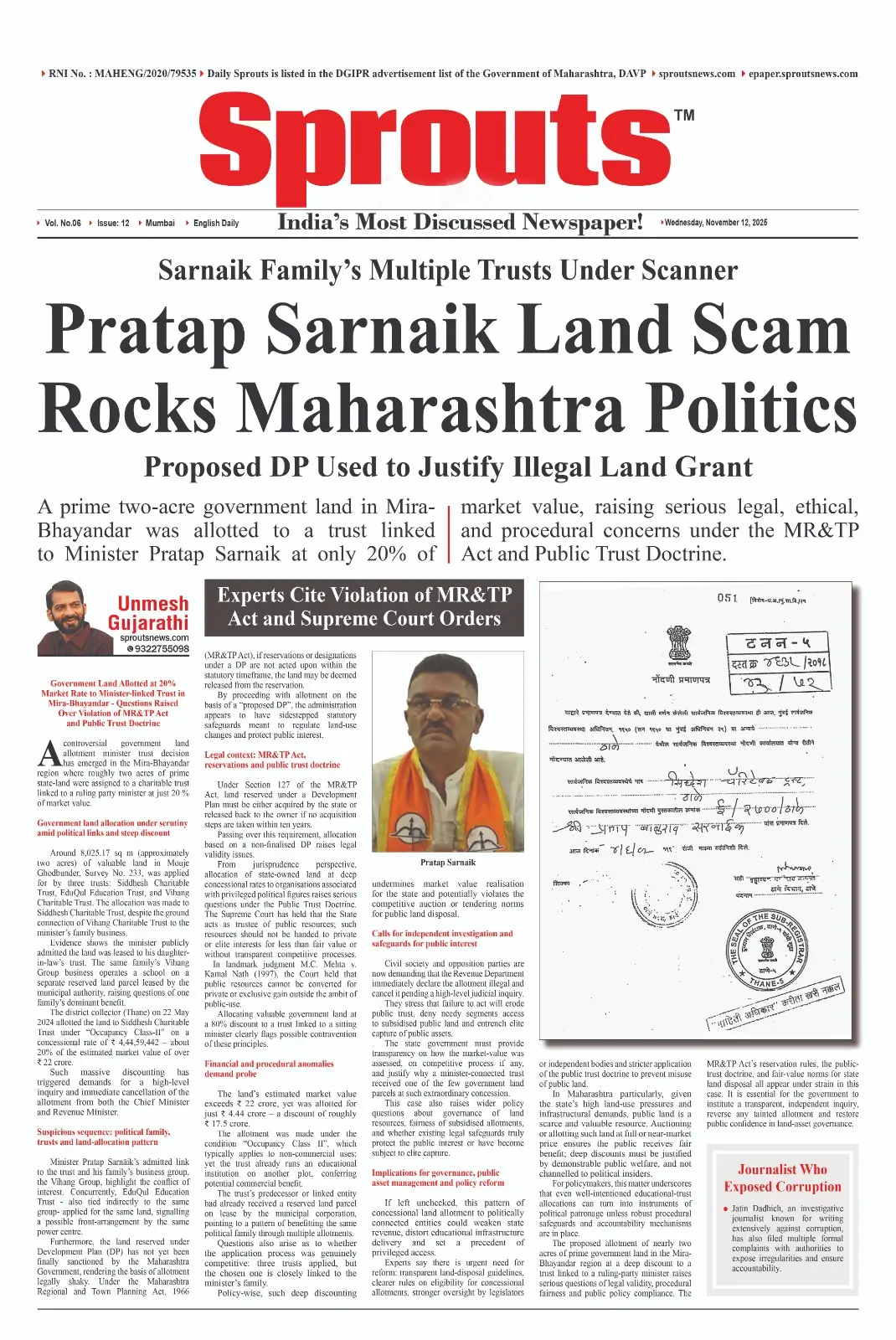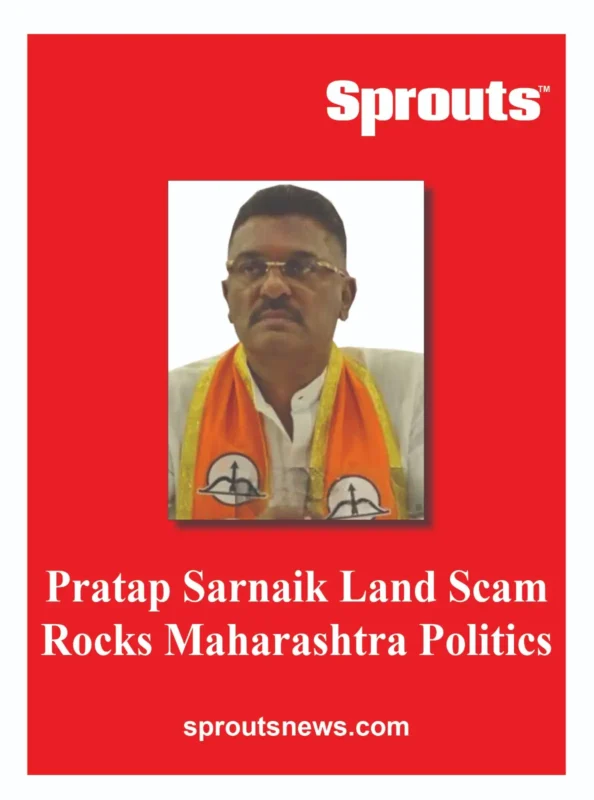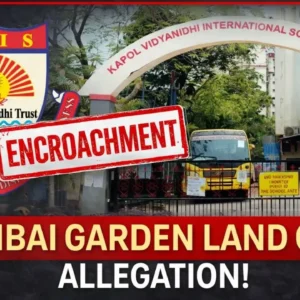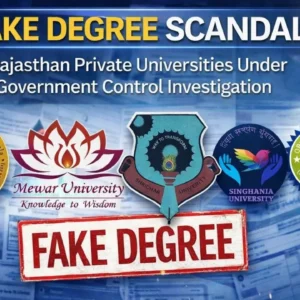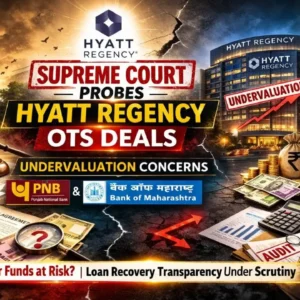Government Land Allotment to Minister-Linked Trust in Mira-Bhayandar Sparks Legal and Political Storm
• Minister’s Family-Linked Trust Secures ₹22 Crore Plot for ₹4.44 Crore
• Allotment Based on ‘Proposed DP’ May Breach MR&TP Act and Public Trust Doctrine
• Multiple Family-Controlled Trusts Applied for Same Plot, Undermining Transparency
A Sprouts News investigation reveals a controversial government land allotment in Mira-Bhayandar, where a two-acre state-owned plot worth ₹22 crore was given to a trust linked to Minister Pratap Sarnaik for only ₹4.44 crore. The allotment, based on a “proposed DP” and involving multiple family-connected trusts, has raised questions over violations of the MR&TP Act and the Public Trust Doctrine. The case has ignited legal scrutiny and political outrage over potential misuse of public assets.
- Government Land Allotment to Minister-Linked Trust in Mira-Bhayandar Sparks Legal and Political Storm
- • Minister’s Family-Linked Trust Secures ₹22 Crore Plot for ₹4.44 Crore
- • Allotment Based on ‘Proposed DP’ May Breach MR&TP Act and Public Trust Doctrine
- • Multiple Family-Controlled Trusts Applied for Same Plot, Undermining Transparency
- Government Land Allotted at 20% Market Rate to Minister-linked Trust in Mira-Bhayandar – Questions Raised Over Violation of MR&TP Act and Public Trust Doctrine
- Government land allocation under scrutiny amid political links and steep discount
- Suspicious sequence: political family, trusts and land-allocation pattern
- Legal context: MR&TP Act, reservations and public trust doctrine
- Financial and procedural anomalies demand probe
- Calls for independent investigation and safeguards for public interest
- Implications for governance, public asset management and policy reform
- Journalist Who Exposed Corruption
Click Here To Download the News Attachment
Government Land Allotted at 20% Market Rate to Minister-linked Trust in Mira-Bhayandar – Questions Raised Over Violation of MR&TP Act and Public Trust Doctrine
A controversial government land allotment minister trust decision has emerged in the Mira-Bhayandar region where roughly two acres of prime state-land were assigned to a charitable trust linked to a ruling party minister at just 20 % of market value.
Government land allocation under scrutiny amid political links and steep discount
Around 8,025.17 sq m (approximately two acres) of valuable land in Mouje Ghodbunder, Survey No. 233, was applied for by three trusts: Siddhesh Charitable Trust, EduQul Education Trust, and Vihang Charitable Trust. The allocation was made to Siddhesh Charitable Trust, despite the ground connection of Vihang Charitable Trust to the minister’s family business.
Evidence shows the minister publicly admitted the land was leased to his daughter-in-law’s trust. The same family’s Vihang Group business operates a school on a separate reserved land parcel leased by the municipal authority, raising questions of one family’s dominant benefit.
The district collector (Thane) on 22 May 2024 allotted the land to Siddhesh Charitable Trust under “Occupancy Class-II” on a concessional rate of ₹ 4,44,59,442 – about 20% of the estimated market value of over ₹ 22 crore.
Such massive discounting has triggered demands for a high-level inquiry and immediate cancellation of the allotment from both the Chief Minister and Revenue Minister.
Suspicious sequence: political family, trusts and land-allocation pattern
Minister Pratap Sarnāik’s admitted link to the trust and his family’s business group, the Vihang Group, highlight the conflict of interest. Concurrently, EduQul Education Trust — also tied indirectly to the same group — applied for the same land, signalling a possible front-arrangement by the same power centre.
Furthermore, the land reserved under Development Plan (DP) has not yet been finally sanctioned by the Maharashtra Government, rendering the basis of allotment legally shaky. Under the Maharashtra Regional and Town Planning Act, 1966 (MR&TP Act), if reservations or designations under a DP are not acted upon within the statutory timeframe, the land may be deemed released from the reservation.
By proceeding with allotment on the basis of a “proposed DP”, the administration appears to have sidestepped statutory safeguards meant to regulate land-use changes and protect public interest.
Legal context: MR&TP Act, reservations and public trust doctrine
Under Section 127 of the MR&TP Act, land reserved under a Development Plan must be either acquired by the state or released back to the owner if no acquisition steps are taken within ten years.
Passing over this requirement, allocation based on a non-finalised DP raises legal validity issues.
From jurisprudence perspective, allocation of state-owned land at deep concessional rates to organisations associated with privileged political figures raises serious questions under the Public Trust Doctrine. The Supreme Court has held that the State acts as trustee of public resources; such resources should not be handed to private or elite interests for less than fair value or without transparent competitive processes.
In landmark judgment M.C. Mehta v. Kamal Nath (1997), the Court held that public resources cannot be converted for private or exclusive gain outside the ambit of public-use.
Allocating valuable government land at a 80% discount to a trust linked to a sitting minister clearly flags possible contravention of these principles.
Also Read: Rahul Gandhi Faces Court Heat in Savarkar Defamation Case.
Financial and procedural anomalies demand probe
The land’s estimated market value exceeds ₹ 22 crore, yet was allotted for just ₹ 4.44 crore – a discount of roughly ₹ 17.5 crore.
The allotment was made under the condition “Occupancy Class II”, which typically applies to non-commercial uses; yet the trust already runs an educational institution on another plot, conferring potential commercial benefit.
The trust’s predecessor or linked entity had already received a reserved land parcel on lease by the municipal corporation, pointing to a pattern of benefitting the same political family through multiple allotments.
Questions also arise as to whether the application process was genuinely competitive: three trusts applied, but the chosen one is closely linked to the minister’s family.
Policy-wise, such deep discounting undermines market value realisation for the state and potentially violates the competitive auction or tendering norms for public land disposal.
Calls for independent investigation and safeguards for public interest
Civil society and opposition parties are now demanding that the Revenue Department immediately declare the allotment illegal and cancel it pending a high-level judicial inquiry.
They stress that failure to act will erode public trust, deny needy segments access to subsidised public land and entrench elite capture of public assets.
The state government must provide transparency on how the market-value was assessed, on competitive process if any, and justify why a minister-connected trust received one of the few government land parcels at such extraordinary concession.
This case also raises wider policy questions about governance of land resources, fairness of subsidised allotments, and whether existing legal safeguards truly protect the public interest or have become subject to elite capture.
Implications for governance, public asset management and policy reform
If left unchecked, this pattern of concessional land allotment to politically connected entities could weaken state revenue, distort educational infrastructure delivery and set a precedent of privileged access.
Experts say there is urgent need for reform: transparent land-disposal guidelines, clearer rules on eligibility for concessional allotments, stronger oversight by legislators or independent bodies and stricter application of the public trust doctrine to prevent misuse of public land.
In Maharashtra particularly, given the state’s high land-use pressures and infrastructural demands, public land is a scarce and valuable resource. Auctioning or allotting such land at full or near-market price ensures the public receives fair benefit; deep discounts must be justified by demonstrable public welfare, and not channelled to political insiders.
For policymakers, this matter underscores that even well-intentioned educational-trust allocations can turn into instruments of political patronage unless robust procedural safeguards and accountability mechanisms are in place.
The proposed allotment of nearly two acres of prime government land in the Mira-Bhayandar region at a deep discount to a trust linked to a ruling-party minister raises serious questions of legal validity, procedural fairness and public policy compliance. The MR&TP Act’s reservation rules, the public-trust doctrine, and fair-value norms for state land disposal all appear under strain in this case. It is essential for the government to institute a transparent, independent inquiry, reverse any tainted allotment and restore public confidence in land-asset governance.
Journalist Who Exposed Corruption
Jatin Dadhich, an investigative journalist known for writing extensively against corruption, has also filed multiple formal complaints with authorities to expose irregularities and ensure accountability.



